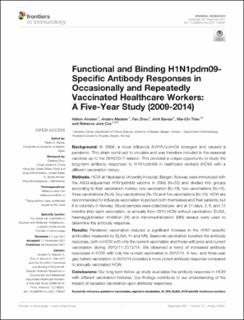| dc.contributor.author | Amdam, Håkon | |
| dc.contributor.author | Madsen, Anders | |
| dc.contributor.author | Zhou, Fan | |
| dc.contributor.author | Bansal, Amit | |
| dc.contributor.author | Trieu, Mai Chi | |
| dc.contributor.author | Cox, Rebecca Jane | |
| dc.date.accessioned | 2022-04-21T08:05:43Z | |
| dc.date.available | 2022-04-21T08:05:43Z | |
| dc.date.created | 2022-01-06T17:29:50Z | |
| dc.date.issued | 2021 | |
| dc.identifier.issn | 1664-3224 | |
| dc.identifier.uri | https://hdl.handle.net/11250/2991828 | |
| dc.description.abstract | Background: In 2009, a novel influenza A/H1N1pdm09 emerged and caused a pandemic. This strain continued to circulate and was therefore included in the seasonal vaccines up to the 2016/2017-season. This provided a unique opportunity to study the long-term antibody responses to H1N1pdm09 in healthcare workers (HCW) with a different vaccination history.
Methods: HCW at Haukeland University Hospital, Bergen, Norway were immunized with the AS03-adjuvanted H1N1pdm09 vaccine in 2009 (N=55) and divided into groups according to their vaccination history; one vaccination (N=10), two vaccinations (N=15), three vaccinations (N=5), four vaccinations (N=15) and five vaccinations (N=10). HCW are recommended for influenza vaccination to protect both themselves and their patients, but it is voluntary in Norway. Blood samples were collected pre- and at 21 days, 3, 6, and 12 months after each vaccination, or annually from 2010 HCW without vaccination. ELISA, haemagglutination inhibition (HI) and microneutralization (MN) assays were used to determine the antibody response.
Results: Pandemic vaccination induced a significant increase in the H1N1-specific antibodies measured by ELISA, HI and MN. Seasonal vaccination boosted the antibody response, both in HCW with only the current vaccination and those with prior and current vaccination during 2010/11-2013/14. We observed a trend of increased antibody responses in HCW with only the current vaccination in 2013/14. A two- and three-year gap before vaccination in 2013/14 provided a more potent antibody response compared to annually vaccinated HCW.
Conclusions: Our long term follow up study elucidates the antibody response in HCW with different vaccination histories. Our findings contribute to our understanding of the impact of repeated vaccination upon antibody responses. | en_US |
| dc.language.iso | eng | en_US |
| dc.publisher | Frontiers | en_US |
| dc.rights | Navngivelse 4.0 Internasjonal | * |
| dc.rights.uri | http://creativecommons.org/licenses/by/4.0/deed.no | * |
| dc.title | Functional and Binding H1N1pdm09-Specific Antibody Responses in Occasionally and Repeatedly Vaccinated Healthcare Workers: A Five-Year Study (2009-2014) | en_US |
| dc.type | Journal article | en_US |
| dc.type | Peer reviewed | en_US |
| dc.description.version | publishedVersion | en_US |
| dc.rights.holder | Copyright 2021 The Author(s) | en_US |
| cristin.ispublished | true | |
| cristin.fulltext | original | |
| cristin.qualitycode | 1 | |
| dc.identifier.doi | 10.3389/fimmu.2021.748281 | |
| dc.identifier.cristin | 1976170 | |
| dc.source.journal | Frontiers in Immunology | en_US |
| dc.source.pagenumber | 748281 | en_US |
| dc.identifier.citation | Frontiers in Immunology. 2021, 12, 748281. | en_US |
| dc.source.volume | 12 | en_US |

